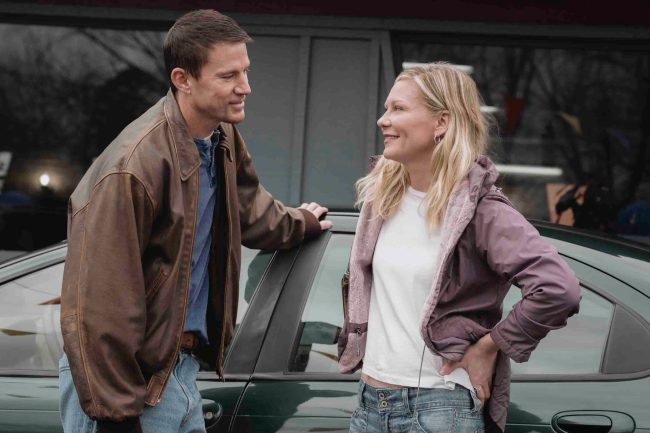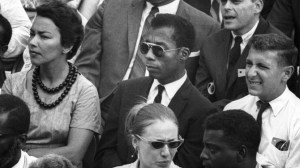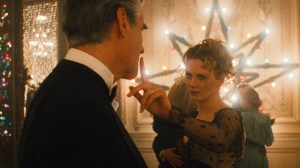The last time I spoke with Kirsten Dunst, for her work in Alex Garland’s 2024 pulse-pounder “Civil War,” it came with an unexpected coda: a win at the National Arts and Entertainment Journalism Awards for that story. So when I was on deck to interview Dunst again, alongside her “Roofman” co-star Channing Tatum, I pulled out the star-shaped award I received for the honor. No pressure for this interview, I joked.
“What’s it say?” Dunst asked, leaning forward to get a better look. “Well, it’s when we talked for ‘Civil War,’ and the name of my piece was Kirsten Dunst Is Our Most Reasonable Movie Star,” I told her.
Tatum beamed. “I like ‘reasonable,’ because that is right. If I ever really needed to get a real perspective on something, I would absolutely come to you,” he said, turning to his co-star. “I would 100 percent want to have your perspective, because I know it would be a reasonable one. On both sides! You wouldn’t just try to take my side.”
Dunst laughed and tried to demure. “No,” she said with a smile. “You would!” Tatum said. “You’d be like, ‘Well, you should probably look at this as well,’ and I’d be like, ‘Damn it. No, you’re right.’”
While Derek Cianfrance’s fact-based feature marks the first time Dunst and Tatum have starred together, the pair are longtime admirers of each other’s work. That admiration is obvious, even through the screen of a Zoom interview, as the pair comfortably traded stories (and compliments) about the other and how that respect and appreciation translated to 2025’s most charming onscreen pairing.
Dunst and Tatum don’t even really interact until the film is almost at its midway mark. Instead, we watch Tatum’s Jeffrey Manchester — based on a very real dude, who became infamous in the late ’90s for breaking into various fast food joints through the roof, then robbing them in quite respectful fashion — admire Dunst’s Leigh Wainscott from afar, kind of. Manchester’s crimes did catch up with him, and when he was thrown into prison in 2000, the way-too clever former soldier cooked up a daring escape, which eventually led him to a natty hiding spot: in a suburban Toys “R” Us.
In Cianfrance’s film, which he wrote alongside Kirt Gunn, Dunst’s Leigh works at that same Toys “R” Us (the real Wainscott didn’t). As Jeffrey carves out a strange (and sometimes fun) existence inside the store, he notices Leigh, a single mom with a sterling work ethic and a real sense of right and wrong. And when he just so happens to run into her at her local church (where the real Manchester and Wainscott met), their immediate chemistry turns into a warm romance.
In a film filled with insane details — most of them true! — Dunst and Tatum are so believable and so real that their bond turns a nutty true crime story into one of the year’s most unexpected crowdpleasers. The first step for both of them? Maybe some nerves about sharing the screen with someone they already liked so much.
“I saw ‘Interview with the Vampire,’ but I wasn’t an actor then, so I didn’t have that [feeling of], ‘I want to work with that little beast of a girl in that movie,’” Tatum said of the first time he remembered taking notice of Dunst. “That movie? She’s literally blowing [out of the water] two of the biggest movie stars and best actors of any generation … I don’t know how that little person just had that in them. She’s now just a little taller, and it’s the same fire in there.”
Dunst seemed to recognize Tatum’s range early, noting that she loved him in both “Foxcatcher” and “21 Jump Street.” “I knew working with Chan was going to be… I just knew,” she said. “I had a feeling about him, and I was right.” (Reasonable!)
Tatum credits Cianfrance for recognizing that his stars would vibe, both in front of and behind the camera.

“Derek really knew that Kirsten and I were just going to immediately connect and get each other,” Tatum said. “We’re very similar in a lot of ways, in the way that we approach the world or move through the world. He just knew, ultimately, that that was going to work, and then we’re just going to genuinely like each other. I think our acting style is very similar. Sometimes you work with people who are so aware of the camera and what they’re doing, and saving their really good stuff for the close-up. And it feels a little, I don’t want to say manipulated, because sometimes that really works. I don’t ever judge anybody’s process, because man, some people give incredible performances that way.”
Dunst was more to the point: “It’s selfish, really. I like to work with people that aren’t selfish actors,” she said. She didn’t need to worry about that with Tatum, who still beams when he thinks back to the first day the pair got to work together.
“If anything, they kept hiding us from each other during the prep for this movie,” Tatum said. “Derek really wanted the first time that we genuinely got to connect and really talk and meet each other [to be] on camera for the very first time, and that was the very first take of the Red Lobster scene. There’s, I don’t know, what, 14, 15 other actresses at that table? And Kirsten just became my safe space. I was so nervous to get to act with her, and then, take one, we just looked at each other for the very first time, and I was just like, ‘Oh, OK. Everything’s going to be OK.”
The scene in question follows Jeffery (going by the name “John Zorn”) and Leigh’s first official meeting, when she invites him to a post-church meal at a local Red Lobster with a bunch of other singletons (all women) from their congregation. Even at a big table in the middle of a chain restaurant, the pair’s giddy chemistry is obvious.
For Dunst, that scene felt “dorky and fun,” the start of something new for both of the characters. “I just had to feel like a woman who is blown away by this guy and trying to figure it out,” Dunst said. “I feel like she’s someone who hasn’t giggled genuinely in a while, or had these feelings that she’s feeling. It was just embracing your inner happiness.”
After the pair leave the restaurant, a blushing Leigh makes a bit of a move on Jeffrey, shyly asking him out on a date. It’s a light, lovely moment, built on the first flush of romance. “Just leaning into all that, because it makes it feel real,” Dunst said. “And that’s what Derek is always fishing for: the most real and authentic performances.”
“The real Jeff told me that Leigh was actually the one moving it forward,” Tatum added. “I think she pushed him against a van and kissed him first, and he was like, ‘Whoa! Jesus.’ Very forward and strong, and he liked it. And he’s goofy, so I get to be goofy in that scene, and the scene outside by the car is just really sweet. We don’t really know each other yet, so we were still trying to figure it out.”
[Editor’s note: Spoilers for the last act of “Roofman” follow.]
One of Dunst’s best scenes, at least by Tatum’s estimation, isn’t even in the final film. Jeffrey’s misdeeds and real identity are, of course, eventually found out. As the walls start closing in, Jeffrey starts to flee, heading to the airport and away from Leigh and her two daughters, who are expecting him for Christmas dinner. But when Leigh calls him, he can’t resist her gentle asks as to when she might expect him.
And though it’s not entirely clear to Jeffrey at that moment, as the audience, we get an inkling of what’s happening: Leigh has been tasked with bringing him back in. In the final film, we only see Tatum’s side of the conversation, but Dunst’s was also shot, with a cadre of cops around her, forcing her to trick the man she loves.
“God, one of Kirsten’s best-acted scenes in the movie, they’re all great, but there was this one,” Tatum said. “I watched the whole scene. I was there watching the scene, and it is just crushing. She’s getting interviewed by the real cops that actually arrested Jeffrey, and they were interviewing her like they would a real suspect, and she just nails this thing. It’s killer.”
The scene didn’t ultimately make it into the film, mostly because everyone agreed it gave too much away and detracted from the raw energy of what Tatum is experiencing in that moment. Dunst doesn’t get fussed about that sort of thing. Even if that scene is not in the film, the emotion is.
“The real Leigh was there that day,” Dunst said. “It didn’t bother me at all, although other people projected that it should bother me. But it didn’t at all. And I felt like, ‘Oh, we shared something in life, kind of’ in that moment for her.”
When Jeffrey arrives at Leigh’s apartment, we know what’s about to happen: He’s going to get caught. As a distraught Jeffrey is grabbed by the cops, a horrified and heartbroken Leigh sits unseen in a cop car, mere yards away. Dunst’s face in these moments is a revelation, her emotions so present, her expression so raw.
“I don’t really think about what I’m doing with my face, because then I probably would not be genuine,” she said of that scene. “I did listen to a Nina Simone song during that take. Sometimes, I look for other people’s performances, whether it’s a live performance [or something else], and that connects me to the realness of being a human being. I think your job is just to give your guts. You know what I mean? And so I just try and put myself in a place that feels authentic for myself, and I think that people can smell whether something feels genuine or not.”
Tatum nodded next to her. “‘Give your guts’! I love that. I’m stealing that,” he said.
Dunst chuckled. “Otherwise, what am I doing here? You know what I mean? It’s a job that I do,” she said. “I don’t think, ‘Oh, people are going to watch this and judge me.’ I don’t judge myself, I don’t judge… And you know what? If people don’t like me anymore, then I’ll go do something else. It’s like, I don’t know what to tell you. This is what you get.”
Tatum smiled at his co-star. “I think you’re good. I think they like it. I don’t think you have to do anything else.”
A Paramount Pictures release, “Roofman” is now available on digital platforms.


